Fear and Loathing in and out of Luhansk
Ukrainian refugee describes his flight to Homyel
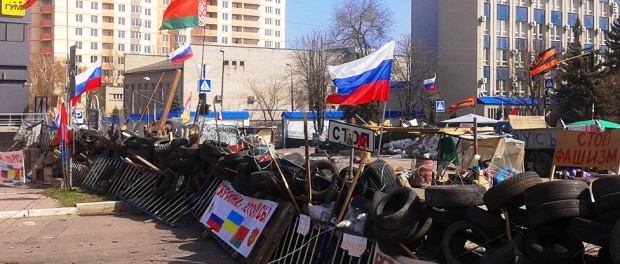 Photo by Qypchak via Wikimedia Commons
Photo by Qypchak via Wikimedia Commons
A refugee from Luhansk, Ukraine, who preferred to go by just the name “George” had arrived alone at a social services center for families and children in Homyel, in which today a dozen civilians from the Donbas area of Ukraine temporarily reside. All of them fled their homes in Donetsk and Luhansk oblasts, almost universally to the sound of gunfire and the rumble of explosions.
Even with roommates, it’s better not to talk about politics
The person from the social services center who arranged this interview was very specific about not giving real names or photos, for fear that people still back in the Donbas who are associated with the refugee could suffer negative consequences. George had crossed the Ukrainian-Russian border without authorization to do so in order to get to Homyel. “For that, I could receive punishment under an administrative article, or in the best case, simply a large fine,” said George. “As to asylum, for which I intend to ask, I do not know how the authorities here will regard that.”
Sitting in the children’s playroom of the center, George and the interviewer would watch as employees occasionally dropped off donated items. People regularly donated clothing, food, and personal hygiene items. Often the staff would interrupt the interview to ask for help in bringing in large plastic sacks of donated goods. And after returning, each time George ensured that the doors were closed tightly before continuing.
“You know, people have different political views of what we’ve got going on,” he said about Ukraine. “Even roommates here have no consensus on these issues. We absolutely relate to one another on other issues, but on politics, we agreed not to talk at the start. Later, we could communicate a little. But a short conversation was enough to understand the basic differences of opinions. It’s easy to spot this in just in the words used: if someone used the word ‘separatists’, they belonged to one camp, while in the other, such individuals would emphatically call the same people only as ‘terrorists’.”
How the sleeping separatist awoke
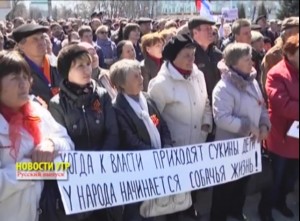
Protesters in Luhansk holding a sign that reads: “When SOBs come to power, the people are faced with a dog’s life.” Photo taken from Ukrainian Radio and Television via Wikimedia Commons
George began his story about how events unfolded in Luhansk with events from last winter. “I was there on the Maidan,” he said, referring to Maidan Nezalezhnosti, where long-running protests against former Ukrainian President Viktor Yanukovych’s decision to turn away from a European Union association agreement in favor of Russia’s Eurasia Union became violent near the end of the Sochi Winter Olympics in February.
“It seemed that even before the clashes took place – I can’t say I know exactly when, because I wasn’t personally involved with any of these actions one way or the other – but Anti-Maidan demonstrators began to form and create counter-demonstration units. They even tried to put together a bunch of morons in order to stir up trouble. But personally, I do know some very intelligent people who joined with the Anti-Maidan protesters, people with higher education who are fluent in several languages. Some simply didn’t like the pro-West foreign policy ideals, others didn’t like someone else… but they joined just to express serious criticism.”
“If to talk about the mood in general, initially there was a strong Pro-Yanukovych sentiment in Luhansk, but gradually this came to naught,” George recalled. “Those supporting him, they became less and less in number. Frankly, that pleased me because the Party of Regions monopoly in the Donbas, and Yanukovych’s control of the whole country just got…”
George changed tack to describe his personal view of why separatism broke out in Luhansk. He said that separatist sentiment in the city had “dozed” for a long time. A certain fraction of the people had long wanted the city to separate and join Russia. Back in the 1990s, conversations would sometimes go, “And who told you that Luhansk was part of Ukraine?”
George observed that these remarks gradually disappeared from conversation, but apparently the mood had not gone away. He said it merely was not openly expressed. “When Yanukovych was overthrown, the topic (about Luhansk joining Russia) again came up and it unwound. It all started with the capture (by militants) of the regional administration building, the prosecutors’ office, and the police department. They grabbed one institution, then another. The Internal Ministry troops (assigned to guard these) dispersed, and gradually, (the militants) took hold of all the administrative agencies.”
Sloviansk rumors inspired support for the separatists
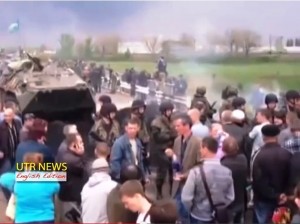
Protesters blocked Ukrainian army unit in April near Sloviansk near start of rebellion. Photo by Ukrainian Television and Radio via Wikimedia Commons
In April, the town of Sloviansk, 150 kilometers from Luhansk, likewise fell to militants, and in early May, the Ukrainian army attempted to retake the city. Rebel commander Igor Strelkov (nom-de-guerre of retired Russian Intelligence Colonel Igor Girkin) told Russian state media that “peaceful civilians” were among the casualties in fighting. Among inhabitants of Sloviansk, this led to the rumor that the Ukrainian army was bombing residential neighborhoods without military necessity. This rumor, according to George, significantly touched the residents of Luhansk on the eve of their May 11 referendum.
“Pro-Russian sentiment was really massive,” he said. “It was felt. Of those with whom I spoke, many voted for independence, even those who previously hesitated. Sure, maybe some of the sentiment was exaggerated by the separatists, but it really grew. People voted. There were even tents on the streets (to accommodate the voting). The rumor that someone might have been forced at gunpoint to vote, this I personally did not see or hear.”
Administrators of the vote within the self-declared Lugansk People’s Republic announced that their voter turnout was 81 percent of all residents, while the Ukrainian Ministry of Internal Affairs put the number closer to 24 percent (most of which were in Luhansk itself). Of those who voted, 96.2 percent voted in favor of independence from Ukraine, a figure, vastly unlike that of the total vote count percentage, is generally not disputed.
Quickly getting used to explosions
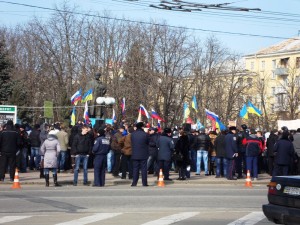
Protesters rally near the Taras Shevchenko statue in Luhansk in March. Photo by Lystopad via Wikimedia Commons
Skirmishes within Luhansk, George said, took place before the restoration of full-scale hostilities between the military and separatist militia early this month. At night, gunfire was heard, including rocket-propelled grenades. On June 2, when militants attempted to take guard posts on the Russian border, the building of the regional state administration, taken over at the start of the rebellion, was hit by rockets.
“I was sitting at home, and then relatively close I heard such a powerful explosion – ba-bakh!” said George. “After that, the city center was almost always empty. People were afraid to go out. Prior to the explosion, almost from the beginning (of the rebellion), people lived a normal life. They all went to work, sat at cafes, and posted signboards for businesses. We quickly adapted. When we first heard shots, we instinctively fell. We tried not to go out of the house, but then, one-two-three, we got used to it. I remember sitting with a friend in my garden – then the shooting began somewhere nearby. ‘Oh, shoot!’ I’d say, ducking down. But then we’d sit again.”
“We lived on a relatively short street,” George said. “The shooting might start on one end, there would be stun grenades and tear gas, but then kids would just go home to their parents and walk in as if nothing had happened. Even parents at work would not call home to see if everything was okay. I think people just went into a sort of shock; whether they simply didn’t understand what was going on, or purposefully ceased to understand what was happening, nobody was expecting that a civil war, with real conflict, would break out…”
Police role, or lack thereof, in the rebellion
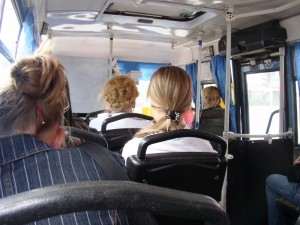
Public transit vans are a common target for separatists and bandits in Luhansk. Photo by CC BY-SA 3.0 via Wikimedia Commons
George then described the police. “From the very beginning of the armed conflict, they took a neutral stance,” George said. “Assessing the balance of forces, law enforcement officers did not even try to counter the separatists. As they did before, they only pursued common criminals. Together, they would keep order with ‘Berkut’ guards (remnants of the now disbanded Ministry of Interior special police force), who rode masked through the streets in jeeps. They might respond to some minor offense, like smoking ‘grass,’ but then they stopped even doing that because of a lack of time and effort.”
As a result, crime surged. “You’d see some hooligan guarding the entrance of a store,” George said. “If you challenged him, he’d attack you. They enjoyed impunity and became very arrogant. They’d rob minibuses. People with guns would stop the public transit vans, take from the passengers all their money and jewelry, and then leave. Whether they were criminals or separatists, we did not know; distinguishing between the two was difficult. The separatists would often appeal to people to give something to meet their needs. Sometimes, for ideological reasons, someone would come in and just take things, and others would just take advantage of the situation for personal gain. In the day, the separatists would be soldiers, and in the evening, they would put on masks and loot.”
“Admittedly, though, separatists were taking measures to stop the drug trade,” George said. “Before, drug dealers could even be the police, and they quite freely sold. People always knew from who they could buy. So-called ‘spice traders,’ were later caught and beaten. The police, of course, did not intervene. Maybe they were a little inspired toward cracking down on the trade.”
The city became more dangerous as the attacks increased. George recalled the fighting on the night of June 2, when separatists attacked and battles raged nearby on the Russian border. He didn’t see corpses on the streets, but when he came to the hospital to meet with a friend at the head trauma department, that person didn’t have the time even to step out. “I was told that no one was leaving the operating room, there were so many wounded,” he said.
Rage on a hair-trigger in refugee camps
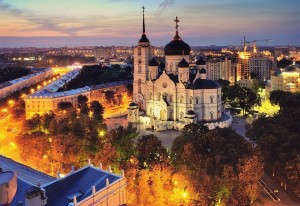
Blagoveshchensky Cathedral, signature building for Voronezh. Photo by Denis Bychkov via Wikimedia Commons
George said that when he decided to leave the city, he hardly hesitated. His decision to get out matured long before that moment. Work in his profession as a specialty nurse had dried up. Many other Luhansk residents had already evacuated by train to central and western Ukraine. Those who had relatives in the more peaceful regions could count on their help. They’d willingly invite their whole family from the Donbas to stay with them. However, George went in the other direction. He decided to flee to Russia.
“Of course, everywhere there are normal, civilized people who can accept any point of view, even those diverging from their own opinion, and not dwell on it,” George said. “But the question is, how do you establish yourself as their neighbor? Indeed, no one knows how relationships develop. Maybe it will be that those who receive you today with open arms will tomorrow just kick you. In general, this atmosphere of fear and hatred creates a lot of strain.”
George crossed the border into Russia walking through a checkpoint that the Ukrainian side controlled. They looked over his documents without really checking anything, and then gave him the green light. George intended to go to Moscow. He hoped to contact the Embassy of the Netherlands and ask for asylum. But while in transit in Voronezh, he contracted food poisoning and had to be hospitalized. Later, he stayed at a refugee center that had been adapted from a children’s camp. It had two-story buildings with rooms for people to stay in. There were already hundreds of people from Ukraine there.
“The Russian side, I must say, tried to provide for refugees with good food and medicine,” George said about conditions in the camp. “They didn’t always succeed, of course, as everything is done by the book. But the main problem isn’t that. At the camp, I had a conflict with some of the refugees from Sloviansk. Among them were those who refuse to associate with anyone who has even a slightly different view. But we were all in the same room, and in one conversation I casually said that I did not support the Euromaidan protesters, but that I liked that they overthrew Yanukovych. They snapped at me, threatening, ‘We’ll tear your head off!’ Everything really was very serious, and I really was waiting the hours through that evening to see if they would come to kill me or not.”
“This is exactly the sort of hatred I fear,” he said. “(From just a couple of words), they got it in their head that I was a Maidan protester that somehow made it to a refugee camp in Russia. At the camp, I saw a lot of people who have experienced a lot of psychological trauma in the fighting. They lost relatives, saw their homes destroyed. For them, Yanukovych, whatever he did in his regime, they associate his presidency with a peaceful life. With him, they did not have any shootings, they could live quietly in their homes, sleep peacefully, and not have to flee the country. And any talk that his overthrow benefited Ukraine, they regard as offensive.”
Overnighting in monasteries and with friendly strangers
George left the camp without further incident, and quietly went to Belarus. He arrived in Homyel, and according to his own words, he spent some days wandering. The migration service processed some documents needed to stay in the country, and he waited for a bed to become available at the social services center. For a week, he slept at the Orthodox Monastery of St. Nicholas, and then he started hanging around with some of the casual youths who gathered in the evening in Gromyko Square on Sovietskaya Street and across from the Arcade shopping center.
“I’m rather a hippie, and that sort of helped,” smiled George. “I’d approach someone, explained my situation, and they’d respond by giving me a place to sleep. True, some of those who sheltered me, it was all booze and the apartment was really awful. I had to sleep sitting up. But it was better than sleeping on the streets.”
“Generally, people react differently,” George said about his life as a homeless refugee. “There are those who are sympathetic and willing to help, but then there are those who, in my opinion, generally laugh at our grief. One man even said to me, ‘You didn’t appreciate freedom in the Donbas, and now you are paying for it.’ It was so unpleasant, and he surprised me with such frank Social Darwinism. When you are carrying around a bag, spending sleepless nights in the city, people think that you are a bum and they have a dismissive attitude toward you. They don’t hear when you tell them you are a refugee with nowhere to go. Here there is snobbery towards anyone who stands on a level lower than you on the social ladder. Even in Ukraine and Russia, it’s less pronounced.”
He spent his last few days waiting at the St. John of Korma monastery, 45 kilometers out of town, before a bed became available in the center.
Everyone in the world is so polarized… it’s sad
When asked about his future prospects, George said that as long as there is armed conflict in Ukraine, he isn’t going to return. Even though there has been an amnesty for those who, like him, left the country illegally, he still plans to seek asylum with the Embassy of the Netherlands.
“In this situation, I’m absolutely neutral,” George said. “I really did not like the early events in Kyiv, when Euromaidan and Anti-Maidan protesters kept marching up to each other and beating each other in the streets, and then when things escalated into this civil war. But I am under the strong impression that none of this is connected with the shootings, explosions, and gunfire. On the Ninth of May, my friend and his wife went to celebrate Victory Day wearing St. George’s ribbons. Their neighbors also wore them and put them on their kids. When his wife left in the middle of the parade, some person with two bats jumped out and just started beating him. He called for help, and his neighbors came to the rescue. The guy’s friends saw this and they joined in the melee. They beat the children, too,” he said with a trembling voice, followed by a long silence.
“I don’t think these were visitors from Western Ukraine,” George said. “They were likely local nationalists. A certain percentage of them would want to remain in Ukraine, even if the majority supported the idea of independence from Kyiv. Yes, early on, things were not going smoothly. However, if they were afraid to express their political views, the threat was mostly from harassment by local officials (who believed differently from them). They would make it impossible to get a job, and so on.”
“But there wasn’t such an open hostility in society,” George recalled. “Even two friends could have different positions but still go fishing together. Of course, there were bursts associated with the intensification of the political situation, but these generally calmed after a awhile. Then it began, the fighting between Maidan and Anti-Maidan. The mutual hatred that could kill you if you thought differently from the other… “
“I remember in April someone (in Luhansk) was celebrating his birthday in the streets. One of the company was a Euromaidan protester who had a yellow-blue Ukrainian flag, and he was met by supporters of the separatists. There was even one guy who was standing with a gun in front of the SBU (Secret Service or Sluzhba Bezpeky Ukrainy) building. We all talked, discussed, argued, but no one was eager to tear the flag from him or beat anyone. And this despite the fact that everyone was drunk. The Euromaidan protesters complain about the people who rose to power from events like this. I think if the war hadn’t started, then those who stood on the Maidan would have again been in the opposition (political minority). The separatists say they do not like the new government, but can you train to resist them while remaining in the same country? Do you understand that you are leading the country to civil war? You have everything now black and white. There is not a single person in the world that is not polarized. And it’s sad. Things can in fact be different.”
By Ruslan Proleskovsky
TUT.By

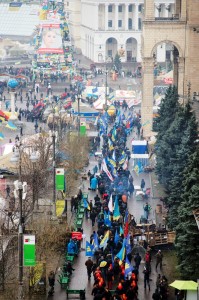
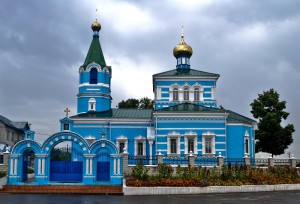





Leave a comment